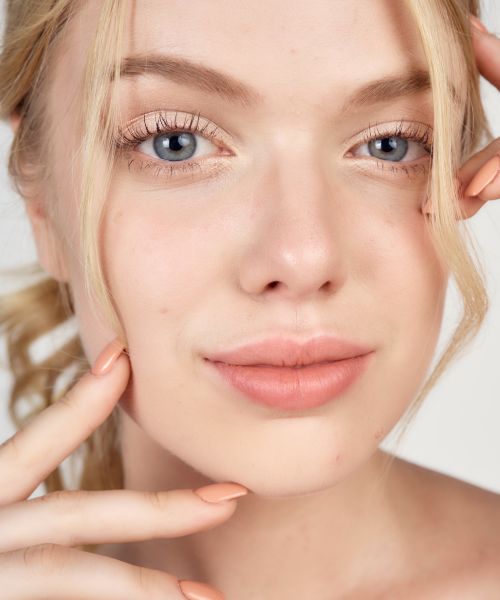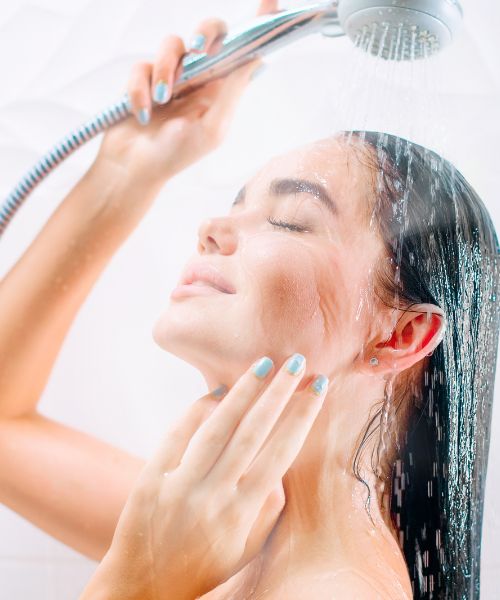• To keep skin hydrated and healthy while on Accutane: use gentle cleansers; avoid harsh cleansers, foaming cleansers, and anything that strips the skin.
• Use proper layering techniques; moisturize with heavy-duty moisturizers containing ingredients like ceramides to lock in hydration.
• Accutane makes skin more susceptible to sunburns and damage. Use SPF 30 or higher every day, reapply every 2 hours or after swimming/sweating, and opt for mineral sunscreens containing zinc oxide or titanium dioxide.
• Consider treatments like professional facials or at-home hydrating/nourishing masks.
• Things to avoid while on Accutane: scorching hot showers, towels (let face air dry naturally); exfoliation (manual scrubs or chemical acids/enzymes); avoid topical retinoids and hair removal methods.
Accutane might be a magic pill for erasing acne, but going through it is certainly not a fun experience.
The side effects of this treatment can be pretty harsh on the skin, leaving it feeling dry, irritated, and uncomfortable.
But don’t worry; there are things you can do to help keep your skin hydrated and healthy while you’re on Accutane.
In this article, we’ll discuss what Accutane is, some common side effects, and how you can take care of your skin while on this medication.

What is Accutane & How Does It Work?
Accutane is the brand name for the medication known as isotretinoin, an oral medication used to treat severe acne on the face and body.
It is commonly prescribed to teenagers during puberty when hormonal levels are at their highest and acne breakouts are the most common.
However, it can also be prescribed to adults with severe acne that has not responded to over-the-counter treatments like benzoyl peroxide or topical retinoids.
Accutane works by slowing down the function of the oil-producing glands.
Once these effects start taking place, the gland will produce less oil, which will help clear acne since excess oil is essentially food for the acne-causing bacteria; therefore, lack of it will cause the bacteria to become starved, thus minimizing proliferation and eventually minimizing acne, too.
What Are The Side Effects of Accutane?
The main side effect of Accutane is skin dryness. This occurs because, as previously mentioned, Accutane works by slowing down the function of the oil-producing glands, and these glands are responsible for keeping the skin soft, supple, and lubricated.
The persistent dryness will then cause various other issues, which can all be counted as Accutane side effects.
Some of these include:
- Chapped lips.
- Dry eyes.
- Itchy skin.
- Flaky skin.
- Nosebleeds.
Additionally, because the skin is more susceptible to damage when it’s dry, people taking Accutane may also be more prone to sunburns and heal slower from cuts or scrapes.
Finally, and in some cases, Accutane use can cause joint pain because the oil-producing glands are also responsible for keeping the joints lubricated.
And while more severe side effects are pretty rare, it is important to be aware of them so that you can take steps to mitigate them.
How to Keep Skin Hydrated While on Accutane?

Since Accutane works from the inside, yet its side effects manifest primarily on the outside, it can be difficult to find an effective method of combating the dryness.
This is why having an excellent skincare routine is so important when taking Accutane.
Here are some best ways to keep your skin hydrated and healthy while on Accutane:
Gentle Cleansing
Avoiding harsh cleansers is key while on Accutane. These will only further dry out your skin and cause it to become red, itchy, and flakey.
Instead, opt for something that has a milky consistency, as these usually contain milder surfactants that will still clean your skin without stripping.
On the other hand, avoid anything that foams up excessively, as these often contain harsher cleansing agents.
Proper Layering
When on Accutane, you want to make the most out of your skincare products, which is why using them correctly is so important.
The rule of thumb is to always start with the lightest product and work your way up to the heaviest.
So, depending on how many hydrating products you want to introduce into your skincare routine, here are some options and how to apply them:
Toner: The lightest product in your routine, toners help restore the skin’s natural pH balance and can also help prep the skin for the next steps. Apply it on clean, damp skin to help lock in hydration.
Essence: Essences are slightly heavier than toners yet lighter than serums, and they help to intensely hydrate the skin. Apply it on clean, damp skin or while it is still damp from using a toner.
Serum: A must in any routine, serums are packed with active ingredients that target specific concerns. However, while on Accutane, you only need to focus on hydrating serums. Apply it on clean, damp skin or while your skin is still damp from the essence or toner, depending on which one you’re using.
Moisturizer: The final product in most skincare routines, moisturizers help seal in all the hydration from your previous steps and prevent water loss. When on Accutane, opt for heavy-duty moisturizers that contain ingredients like ceramides, which are lipids naturally found in the skin and mimic their barrier function.
Oil: Facial oils are not a must, but they can be used to help create a barrier on the skin and lock in all the hydration from the previous steps. You should ideally apply oil after moisturizing, as using an oil-based product after a water-based one, like toners, essences, or serums, can cause the latter to ball up and not be as effective.
Petroleum Jelly
Petroleum jelly can be a great addition to an Accutane skincare routine, especially for those who get really dry and cracked skin around the mouth or the nose.
Sometimes, applying petroleum jelly on the nostrils can also stop nosebleeds, which in some cases, can be a side effect of Accutane.
To use, simply apply a small amount to the areas of the skin that are prone to dryness and irritation. And since petroleum jelly is occlusive, meaning it forms a barrier on the skin, it’ll also help to lock in hydration, so using it after your moisturizer is a good idea.
Hydrating Sunscreens
As I already mentioned, by drying out our oil, Accutane makes the skin more susceptible to sunburns and damage, which is why using sunscreen is so important.
Our oil contains fat molecules or lipids that help protect our skin from the sun, so when that’s gone, we need to find another way to replace that protection.
Wearing SPF 30 or higher every day is a must, and opting for mineral sunscreens that contain anti-inflammatory ingredients like zinc oxide or titanium dioxide can also help calm the skin.
When applying sunscreen, use enough to cover your entire face and neck. And since sunscreen must be reapplied every 2 hours or after swimming or sweating, carrying a small tube with you is a good idea.
Weekly Treatments
A weekly treatment can involve seeing an esthetician for a professional facial or using at-home products like hydrating and nourishing masks that help replenish the skin and relieve dryness caused by Accutane.
Things To Avoid While on Accutane

While you probably won’t have to switch up your entire daily routine, there are a few things you should avoid while on Accutane.
Some of these can further dry out the skin or make existing side effects worse, while others could potentially damage your skin, so here are a few everyday things to avoid while on Accutane:
Scorching Hot Showers
Scorching hot showers might be one of the most pleasant things to do during the cold months, but they’re not doing your skin any favors, especially when you’re on Accutane.
The hot water and steam can strip the skin, leaving it dry, tight, and irritated. So, instead of cranking up the heat, opt for warm water and try to limit your showers to no more than ten minutes.
Use of Towels
Using towels on your face or body can also irritate the skin, especially while on Accutane, as the fabric can be rough, and rubbing the skin too hard can cause inflammation.
So, the best thing to do is to completely skip the towel for the face and let your skin dry naturally. It will only take a couple of minutes, and you can do your skincare routine when your skin is damp, so you won’t have to wait as long.
When it comes to the body, using a soft cotton towel is best, and gently patting the skin dry instead of rubbing is key.
Exfoliation
Be it manual in the form of scrubs or chemical in the form of acids or enzymes; exfoliation can do more harm than good to the skin while on Accutane; therefore, it’s best to avoid it.
Your skin is already at a super sensitive stage, so exfoliating it can cause irritation, redness, and dryness, which are all things you want to avoid.
Retinoids
Topical retinoids are great for the skin, but while on Accutane, it’s best to stay away from them.
There are ways to combine both treatments, but this can go wrong easily, so since Accutane is essentially a retinoid on steroids, it’s best to finish the course and then go back to using your retinoids.
While the skin is going through the drying process of Accutane, it’s important to be extra careful and gentle with it, and that includes knowing what skincare ingredients and products to use and avoid.
Hair Removal
Hair removal methods like waxing, IPL, and laser are definitely a no-no while on Accutane, as they can cause irritation, redness, and even bleeding in some cases.
The active ingredient in Accutane, isotretinoin, has been shown to slow wound healing and increase photosensitivity, which means your skin will be more susceptible to sunburns after IPL or laser hair removal.
On the other hand, waxing while you’re going through Accutane will cause your skin to lift. Lifting off the top layer of skin will cause a wound and may leave dark spots.
Intense Facial Treatments
While some treatments at the salon are not a contraindication for Accutane users, it’s best to avoid anything that’s too harsh on the skin, like microdermabrasion, chemical peels, microneedling, and other intense facials.
These treatments can irritate and seriously damage the skin. This is why you always have to be honest with your esthetician and let them know you’re on Accutane so they can adjust the treatment to benefit your skin and help with the healing process.

My name is Simone and I am a certified skin specialist. I created this website to teach my readers how to take great care of their skin and I also like to occasionally share my honest opinions on skincare products I’ve tried. You can learn more about me here.
